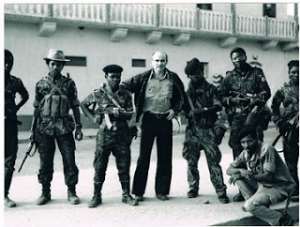
Polish author and journalist Ryszard Kapuściński, travelled extensively throughout Africa, including Ghana
Time is defined as continued progress of existence and events in the past, present and future regarded as a whole, measured in hours, past midnight and noon. Time changes, because time zones around the Earth come from the fact that the Earth rotates once approximately every 24 hours, and so at any instant, every place on Earth has a different view of the Sun. When it is midday in one place, it has to be midnight halfway around the world from there.
Unfortunately, this definition or explanation of how time works don’t reflect on common African, in business or in administration, because time in Africa, means something different, according to Polish author and journalist, Ryszard Kapuściński. Only a few Africans know what punctuality is about and therefore keep time.
A bad farmer quarrels with his tools, they say and those who hate corrections shall always remain stagnant, without any development or progress. Everyone knows that corruption is one of the chronic diseases which has weakened Africa’s economic infrastructure, yet in Africa, before the freedom of speech gained its foundation, an African journalist can be thrown into prison for accusing a politician of corruption.
Despite written in many newspapers, journals and magazines, over the poor standard of reading in Africa, couple of months ago, when I wrote an article captioned ‘Why Many Africans Are ‘Allergic’ To Reading,’ to encourage Africans that don’t like to read, to cultivate the habit of reading, many Africans, including a so-called Nigerian politician in Belgium, Collin Nweke, attacked me on LinkedIn’s social platform, because they find the article offensive.
If Africans could easily afford education and encourage children to read, like the Europeans or Americans, we would have reached far many years after independence, to rub shoulders with the White man. Someone saying that Africa’s standard of reading is very poor doesn’t mean it’s a disgrace or disrespect to an African, after all, I’m an African too, but we should rather take it as a challenge and thrive to improve things.
After reading Ryszard Kapuściński’s ‘The Shadow Of The Sun,’ I find it extremely hard to leave the book alone, because it has certain facts that are true about Africans, of which supposed I was the writer, many will find the book offensive and call for my crucifixion, like how they attacked me on the social platform.
To introduce Kapuściński: He was a Polish journalist and writer who travelled extensively to many parts of the world, including Africa. Among Poland’s most prolific non-fiction writers, known for his incisive and very personal accounts of political and social upheavals across the world, the writer died in Warsaw on January 23, 2007.
He has devoted several books to Africa, including Heban / Shadow of the Sun. Kapuściński was never afraid of danger, braving malaria, civil war and face-to-face encounters with ruthless dictators to get to the heart of a story. His writings delve into the roots of civil and political strife, digging through centuries of conflict, turmoil, and even ritual in order to paint an account that is simultaneously authentic, informative and touching.
In the ‘Shadow of the Sun, the writer gave an account of his visit to Ghana and one of the topics his emphasized is the lack of seriousness over Africa’s time. Yes! Many Africans don’t know what time is, from the colonial era to this modern times. An African can tell you “I come at 9 AM, means 11 AM or I’m departing at 2 PM, means 4 PM. Time doesn’t mean anything significant to many Africans. The disease is not only in Africa. Africans have exported it to Europe and America too.
From Accra, the capital city of Ghana, on his way to Kumasi, in the Ashanti Region of Ghana, Kapuściński joins a bus when he finds out when the bus leaves, he was told, “Until it’s full.” Ryszard Kapuściński finds it necessary to document this fact in his novel, probably Africa is the first continent he witnessed that.
Frankly speaking, Africa has a long way to go, because we are far behind in everything if we take the story of poor China, decades ago, into consideration. Years after independence, Africa still expect miracles from heaven, forgotten that God helps those who help themselves.
You can’t get a delicious soup by throwing onions, pepper, tomatoes etc, into the water. The ingredients are prepared, thus; Africa needs to fight against corruption, build the nation and create employment for its citizens and stop accusing colonial masters of looting the continent. Yes! They looted, but they didn’t take all the richness of Africa away.




 Akufo-Addo commissions Phase II of Kaleo solar power plant
Akufo-Addo commissions Phase II of Kaleo solar power plant
 NDC panics over Bawumia’s visit to Pope Francis
NDC panics over Bawumia’s visit to Pope Francis
 EC blasts Mahama over “false” claims on recruitment of Returning Officers
EC blasts Mahama over “false” claims on recruitment of Returning Officers
 Lands Minister gives ultimatum to Future Global Resources to revamp Prestea/Bogo...
Lands Minister gives ultimatum to Future Global Resources to revamp Prestea/Bogo...
 Wa Naa appeals to Akufo-Addo to audit state lands in Wa
Wa Naa appeals to Akufo-Addo to audit state lands in Wa
 Prof Opoku-Agyemang misunderstood Bawumia’s ‘driver mate’ analogy – Miracles Abo...
Prof Opoku-Agyemang misunderstood Bawumia’s ‘driver mate’ analogy – Miracles Abo...
 EU confident Ghana will not sign Anti-LGBTQI Bill
EU confident Ghana will not sign Anti-LGBTQI Bill
 Suspend implementation of Planting for Food and Jobs for 2024 - Stakeholders
Suspend implementation of Planting for Food and Jobs for 2024 - Stakeholders
 Tema West Municipal Assembly gets Ghana's First Female Aircraft Marshaller as ne...
Tema West Municipal Assembly gets Ghana's First Female Aircraft Marshaller as ne...
 Dumsor is affecting us double, release timetable – Disability Federation to ECG
Dumsor is affecting us double, release timetable – Disability Federation to ECG
